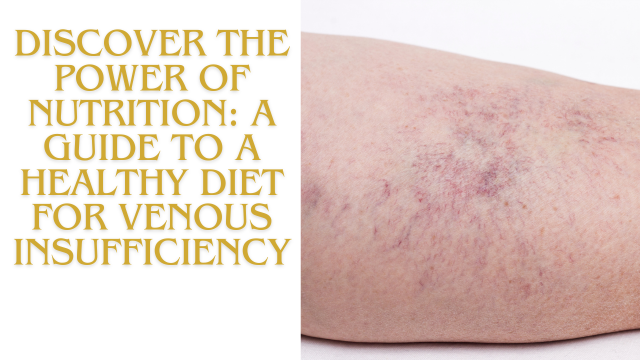Discover the Power of Nutrition: A Guide to a Healthy Diet for Venous Insufficiency
- Jan 6, 2024
- 3 min read

Introduction
Venous insufficiency is a condition that occurs when the blood flow from the legs back to the heart is compromised. It often leads to uncomfortable symptoms like leg pain, swelling, and varicose veins. While medical treatment plays a crucial role in managing venous insufficiency, adopting a healthy diet can also have a significant impact on your overall well-being. In this article, we will explore the power of nutrition and provide a guide to a healthy diet for venous insufficiency.
Understanding Venous Insufficiency
Before delving into the dietary aspects, let's briefly discuss venous insufficiency. The condition arises when the valves in the veins fail to function correctly, leading to the pooling of blood in the legs. Common risk factors for venous insufficiency include obesity, pregnancy, a sedentary lifestyle, and a family history of the condition. It is important to seek medical advice to determine the severity of your condition and receive appropriate treatment.
The Role of Nutrition
The food we consume plays a crucial role in our overall health, and that includes our venous system. A healthy diet can help manage venous insufficiency by promoting circulation, reducing inflammation, and supporting vein health. Let's explore some key nutrition tips for individuals with venous insufficiency.
Hydration: A Fundamental Step
Staying adequately hydrated is crucial for maintaining healthy blood flow and minimizing venous insufficiency symptoms. Aim to drink at least eight glasses of water per day and limit your consumption of caffeinated and alcoholic beverages, as they can dehydrate the body. Additionally, consuming foods with high water content, such as cucumbers, watermelon, and citrus fruits, can contribute to your overall hydration goals.
Embrace a High-Fiber Diet
A diet rich in fiber can have a positive impact on venous insufficiency. Fiber helps regulate bowel movements, preventing constipation, which can place extra pressure on the veins in the lower body. Include whole grains, fruits, vegetables, legumes, and nuts in your diet to boost your fiber intake. Not only will this promote healthy digestion, but it will also support proper blood flow.
Incorporate Anti-Inflammatory Foods
Inflammation can worsen the symptoms of venous insufficiency. To combat this, include foods with anti-inflammatory properties in your diet. Examples include fatty fish like salmon and mackerel, which are rich in omega-3 fatty acids, and colourful fruits and vegetables like berries and leafy greens, which contain antioxidants. These foods not only reduce inflammation but also support overall cardiovascular health.
Optimize Your Protein Intake
Protein is an essential macronutrient that aids in tissue repair and supports the health of blood vessels. Incorporate lean sources of protein, such as poultry, fish, tofu, and legumes, into your meals. Protein can also help with weight management, which is crucial for individuals with venous insufficiency as excess weight can place additional strain on the veins.
Include Foods Rich in Vitamins C and E
Vitamins C and E are known for their antioxidant properties and their support in maintaining healthy blood vessels. Citrus fruits, bell peppers, broccoli, and strawberries are excellent sources of vitamin C. Nuts, seeds, and vegetable oils are rich in vitamin E. Including these foods in your diet can help reduce the risk of venous insufficiency complications.
Conclusion
In conclusion, adopting a healthy diet can significantly impact venous insufficiency management. By incorporating hydration, fiber, anti-inflammatory foods, protein, and vitamins C and E into your daily meals, you can support healthy circulation and alleviate symptoms associated with this condition. However, always consult with a healthcare professional for personalized dietary recommendations based on your specific needs. Remember, taking care of your nutrition is a powerful step towards a healthier and more comfortable life with venous insufficiency.



Comments